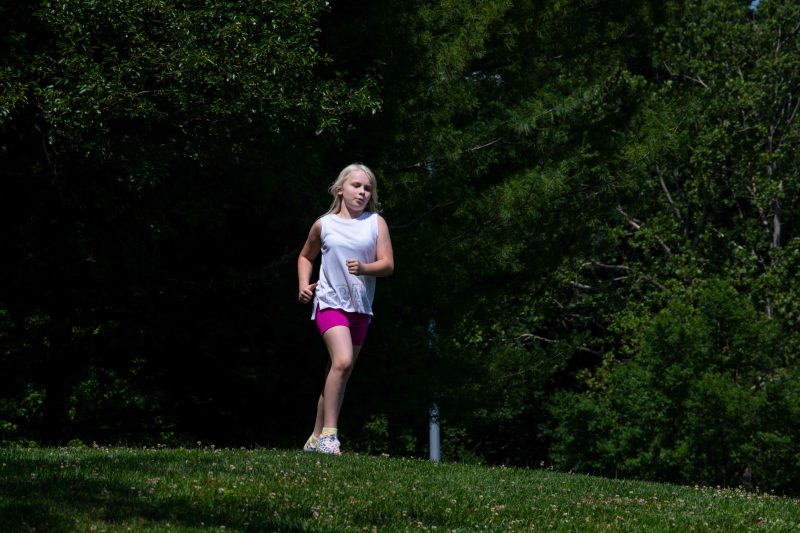The Supreme Court’s first consideration of whether transgender athletes may play on sex-specific school sports teams comes from the state of West Virginia and a 12-year-old named Becky.
The state is asking the high court to allow it to enforce a 2021 law allowing only those whose reproductive biology and genetics were classified as female at birth to play on girls’ teams. The law is on hold while an appeals court reviews its constitutionality; because West Virginia’s request came in the form of an emergency application, the justices could respond at any time.
Becky Pepper-Jackson has presented publicly as a girl since fourth grade, although her mother, Heather Jackson, said in court documents the child identified as a girl long before that. Her name has been legally changed. According to her brief, Becky “receives puberty-delaying treatment and estrogen hormone therapy, so has not experienced (and will not experience) endogenous puberty.”
She joined a cheerleading squad in elementary school in Bridgeport and wanted to run track in middle school because that is what her older brothers do. According to legal briefs filed in the case, she is enthusiastic but far from the best on the team.
“I am not a boy,” Becky wrote in a statement to the court last spring. “I do not want to run with the boys when there is a girls’ team and I should not have to run with the boys when there is a girls’ team. Running with the girls means a lot to me because I am a girl, and I should be treated like a girl, just like all my friends who are girls.”
West Virginia’s request to the high court to allow the law to take effect is supported by Republican attorneys general in 21 states. The law is part of a wave of legislation in recent years directed at transgender and gay individuals, much of which restricts access to gender-affirming medical treatment, sports participation for transgender athletes, or teaching about gender identity and sexual orientation.
In 2020, the Supreme Court ruled on a different case involving transgender rights, finding that a federal law that protects employees against sex discrimination extends to gay and transgender workers.
Becky and her mother say the West Virginia law violates the U.S. Constitution’s 14th Amendment guarantee of equal protection, as well as the Title IX civil rights law barring sex-based discrimination in education.
West Virginia told the Supreme Court the law is needed to protect female athletes from biological males who otherwise would have an advantage and come to dominate their sports.
“The Act makes the reasonable judgment that many have made before: Biological differences between males and females matter in sports,” Attorney General Patrick Morrisey (R) wrote in his petition to the court. “Both Title IX and the Fourteenth Amendment allow that judgment.”
The American Civil Liberties Union, Lambda Legal and private lawyers representing the mother and child called Morrisey’s actions “petty and baseless.” They said there is no reason for West Virginia to seek emergency intervention from the Supreme Court, because Becky has participated for two seasons on the cross-country and track teams without incident. She is the only transgender girl identified by either side as wanting to play on a girls’ team in the state.
West Virginia claims “that what has been the status quo for over a year and a half has suddenly become an emergency requiring this court’s immediate intervention,” said the brief on Becky’s behalf, in which she is identified as B.P.J. (She and her mother have never tried to cloak her identity.)
“There is no emergency, and the only harm at stake is the harm to B.P.J. that would result from barring her from her team,” the petition says.
U.S. District Judge Joseph R. Goodwin blocked the law from taking effect soon after the West Virginia legislature passed it, allowing Becky to try out for the teams. But seven months later, after full briefing, Goodwin concluded the law was constitutional and refused to extend his order while his decision was reviewed.
“While some females may be able to outperform some males, it is generally accepted that, on average, males outperform females athletically because of inherent physical differences between the sexes,” Goodwin wrote. “This is not an overbroad generalization, but rather a general principle that realistically reflects the average physical differences between the sexes.”
He said that given the concession from Becky’s lawyers that “circulating testosterone in males creates a biological difference in athletic performance, I do not see how I could find that the state’s classification based on biological sex is not substantially related to its interest in providing equal athletic opportunities for females.”
Still, Goodwin, nominated to the bench by President Jimmy Carter, indicated he was reluctant. “B.P.J., like all transgender people, deserves respect and the ability to live free from judgment and hatred for simply being who she is,” Goodwin wrote. “But for the state legislature, creating a ‘solution’ in search of a problem, the courts would have no reason to consider eligibility rules for youth athletics.”
Goodwin said he agreed with Becky’s lawyers that “not one child has been or is likely to be harmed by B.P.J.’s continued participation on her middle school’s cross country and track teams.”
Those lawyers appealed Goodwin’s decision to the U.S. Court of Appeals for the 4th Circuit in Richmond, where a divided three-judge panel put the law back on hold while it reviewed the case.
That is the order being challenged at the Supreme Court by West Virginia and Lainey Armistead, a former West Virginia State University female college soccer player who Goodwin allowed to join the case defending the state’s law. Armistead is represented by the conservative Alliance Defending Freedom, a conservative religious rights organization that has been involved in much of the recent anti-transgender legislation.
The state says it deserves to have its law left in place while legal challenges continue. It says there is no discrimination against Becky, whom the state refers to as a “12-year-old biological male who identifies as female.”
“Like all males, B.P.J. can participate on male and co-ed teams,” the state wrote in its petition. “Like all males, B.P.J. cannot play on female teams. West Virginia’s choice to promote equal competitive opportunity for female athletes in this way does not run afoul” of either the Constitution or Title IX.
Becky’s lawyers say there is no evidence she has displaced other girls who want to be on the team, nor does she have a physical advantage. In fact, she was cut from running events on the track team, and now participates in shot put and discus, although not very successfully.
“Despite regularly finishing near the back of the pack, she loves to play, have fun with her friends, and try her best,” her legal brief said.
The ACLU says 19 states over the last three years have passed laws similar to the one in West Virginia. But no appeals court has yet ruled on the constitutionality of such legislation.
The Supreme Court traditionally waits until there is a full airing of legal issues in the lower courts before taking up a dispute. Becky’s lawyers say there is no reason to rush judgment here, where the only result would be to “order B.P.J. off the playing field where she has been for her entire middle school career to date and where her presence harms no one.”
The 4th Circuit has ordered briefing for its review of the case by June. It previously found that a Virginia school board had acted unlawfully in preventing Gavin Grimm, a transgender former high school student, from using the boys’ bathroom before he graduated in 2017. The Supreme Court in 2021 decided not to review the ruling.
The case involving Becky is West Virginia v. B.P.J.








